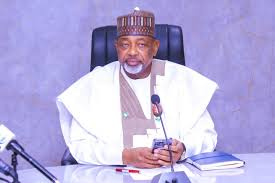By Atoyebi Nike
The Federal Government says it is intensifying reforms in the agricultural sector to secure long-term food self-sufficiency through a stronger seed system, modern farming practices, and expanded global partnerships. The Minister of Agriculture and Food Security, Abubakar Kyari, gave the assurance at the World Food Forum and the Global “Seeds to Foods” Exhibition organized by the Food and Agriculture Organisation.
Kyari said the FAO-Türkiye-Nigeria South-South Cooperation programme is already transforming dry-season farming and strengthening food systems, particularly in Borno State where the project is being piloted. He noted that Nigeria’s expansive farmland, active farming communities, and support from global partners position the country to become a major producer and exporter of high-value crops.
He emphasised that building a resilient seed system is key to boosting farmer productivity and ensuring the nation’s food security. According to him, safeguarding the seed value chain is synonymous with protecting Nigeria’s food future.
The minister reported significant progress under the cooperation programme, including the introduction of new Turkish crop varieties, field demonstrations across communities, and experimental seed-multiplication plots. These have already produced tonnes of improved seed materials, including chickpeas, lentils, and other legumes.
Kyari said the project has strengthened local capacity through technical training, exchange visits to Türkiye, and expanded knowledge of seed processing, post-harvest handling, and value-chain development benefiting many women farmers and specialists.
About $200,000 has been invested so far to support institutional processes, field demonstrations, and farmer training. Boreholes and irrigation tools have also been installed to promote year-round crop production.
Kyari restated the government’s commitment to building a competitive seed industry supported by strong institutions, private-sector collaboration, climate-resilient research, and improved quality-control systems. He described the national seed council as pivotal to meeting domestic and regional crop needs.
He praised Borno State Governor Babagana Zulum for revitalizing farming communities in conflict-affected areas, saying the governor’s work demonstrates that agriculture is both an economic stabilizer and a tool for peace.
